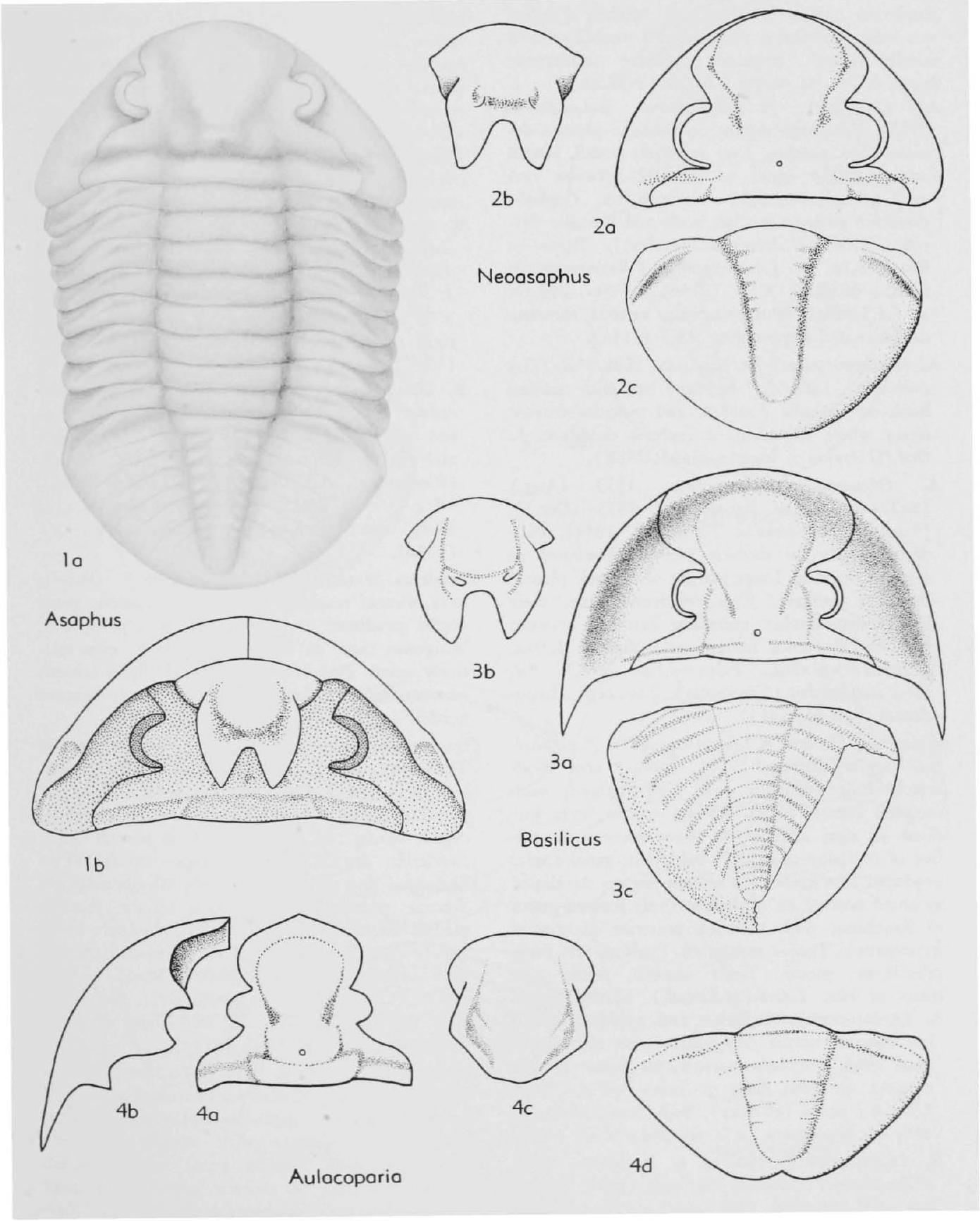Welcome to the Treatise on Invertebrate Paleontology!
Please enter a genera name to retrieve more information.

Asaphus
Classification
Phylum:
Arthropoda
Subphylum:
Trilobitomorpha
Class:
Trilobita
Order:
Ptychopariida
Suborder:
Asaphina
Family:
Asaphidae
Subfamily:
Asaphinae
Formal Genus Name and Reference:
Asaphus Brongniart in Brongniart & Desmarest, 1822, [non Asaphus BRONGNIART in DESMAREST, 1817 (suppressed, ICZN Opinion 510)]
Type Species:
Entomostracites expansus Wahlenberg, 1821 (=Entomolithus paradoxus a expansus LINNÉ, 1768, suppressed, ICZN opinion 296)
Images
(Click to enlarge in a new window)
Fig. 248, 1a. *A. (A.) expansus (Wahlenberg), Swed., exoskel., x1.5 (414n), Fig. 248, 1b. A. (A.) fallax Angelin, ceph., ventral, showing doublure and hypostoma, x1.5 (414n)
Synonyms
Geographic Distribution
NW.Eu.
Age Range
Beginning Stage in Treatise Usage:
L.Ord.(U.Arenig.)
Beginning International Stage:
Floian
Fraction Up In Beginning Stage:
50
Beginning Date:
474.17
Ending Stage in Treatise Usage:
M.Ord.
Ending International Stage:
Darriwilian
Fraction Up In Ending Stage:
100
Ending Date:
458.18
Description
Cephalon and pygidium without any trace of border. Glabella long, reaching external cephalic margin, frontal area absent or very narrow; posterior margin of librigenae typically convex, genal angles rounded or (rarely) pointed (adult specimens only in 1 or 2 species with genal spines). Lateral corners of hypostoma more or less protruding. Librigenal panderian organs developed as notches. pygidial axis long, prominent; pleural fields smooth or very faintly ribbed; pygidial doublure moderately broad.
References
Museum or Author Information
Classification
Phylum:
Arthropoda
Subphylum:
Trilobitomorpha
Class:
Trilobita
Order:
Ptychopariida
Suborder:
Asaphina
Family:
Asaphidae
Subfamily:
Asaphinae
Formal Genus Name and Reference:
Asaphus Brongniart in Brongniart & Desmarest, 1822, [non Asaphus BRONGNIART in DESMAREST, 1817 (suppressed, ICZN Opinion 510)]
Type Species:
Entomostracites expansus Wahlenberg, 1821 (=Entomolithus paradoxus a expansus LINNÉ, 1768, suppressed, ICZN opinion 296)
Images
(Click to enlarge in a new window)
Fig. 248, 1a. *A. (A.) expansus (Wahlenberg), Swed., exoskel., x1.5 (414n), Fig. 248, 1b. A. (A.) fallax Angelin, ceph., ventral, showing doublure and hypostoma, x1.5 (414n)
Synonyms
Geographic Distribution
NW.Eu.
Age Range
Beginning Stage in Treatise Usage:
L.Ord.(U.Arenig.)
Beginning International Stage:
Floian
Fraction Up In Beginning Stage:
50
Beginning Date:
474.17
Ending Stage in Treatise Usage:
M.Ord.
Ending International Stage:
Darriwilian
Fraction Up In Ending Stage:
100
Ending Date:
458.18
Description
Cephalon and pygidium without any trace of border. Glabella long, reaching external cephalic margin, frontal area absent or very narrow; posterior margin of librigenae typically convex, genal angles rounded or (rarely) pointed (adult specimens only in 1 or 2 species with genal spines). Lateral corners of hypostoma more or less protruding. Librigenal panderian organs developed as notches. pygidial axis long, prominent; pleural fields smooth or very faintly ribbed; pygidial doublure moderately broad.
